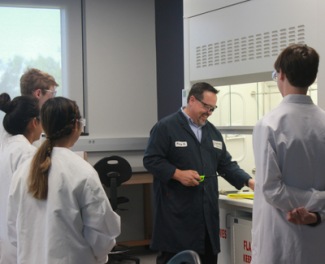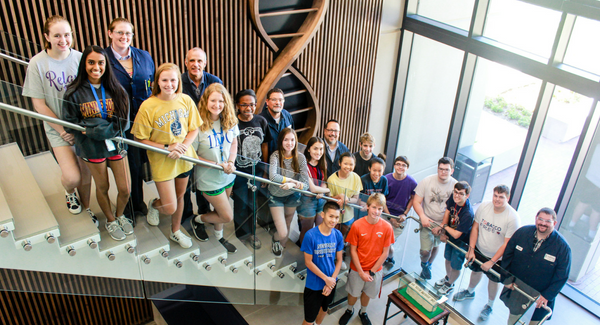As part of the Investigative Summer STEM Program (ISSP), 16 students conducted experiments with scientists from Koch Industries on Thursday, June 21.
The experiments ranged from chromatography to using lycopodium for explosions.
Typically, the ISSP students are bussed to Koch Industries to explore the labs there but due to a remodel, the students and scientists utilized the new Bishop Gerber Science Center facilities this year.
Five chemists from Koch pleasantly surprised the ISSP students with a very hands-on experience. Bishop Carroll High School Juniors Ashley Dinh and Teresa Mainzer both said they were expecting a lecture or panel to talk to them during the allotted time. They were both excited to get out of their comfort zones and actually take part in the experiments.

Koch’s Analytical Chemistry Leader for Refining Chemicals Tony Scott enjoys providing a fun learning experience for the students at ISSP each year. He said he hoped the students got “a little bit of excitement for the sciences and technology and a chance to ask questions about things that they’re interested in.” He added, “I wanted my team to focus on opportunities for the kids and how they can take the tools they have in the math and sciences and build their own little toolkit and then take that with them throughout their life.”
The experiment Scott manned simulated the activity series of metals, specifically understanding corrosion and prohibiting corrosion.
“That’s a big thing in our industry … we have steel product tanks that are exposed to the elements and we want to prevent them from corrosion, so this kind of ties into our company and what we do,” he said.
Michelle Speer is a project chemist at Koch who works in analytical chemistry. She helped with the chromatography experiment. Each student was given a miniature HPLC column and purple Kool-Aid with the goal to separate out the water phase, the blue dye and the red dye.
Speer said, “I think they enjoyed the hands-on portion the most. My goal really was that at the end of this if they know chromatography is separating mixtures and components and that in order to do that they need a stationary phase and a mobile phase, I consider that success.”
Scott said, “We also did some fun demonstrations with lycopodium powder, which simulates kind of what you would see for wheat dust in a grain elevator, something very common to Kansas is grain elevator explosions.”
Students saw firsthand how it’s possible for wheat to explode.
After the experiments, the students sat down with all of the Koch scientists for a question and answer session. The scientists all urged the students to learn as much as they can and to not be fearful of trying new things and changing their path as they go along.
Dinh has been enjoying all that ISSP has to offer so far.
“It’s pretty great,” she said. “It gets me out of my comfort zone. This is my first school-related summer program so it just gives me a heads up as to what colleges do.”


